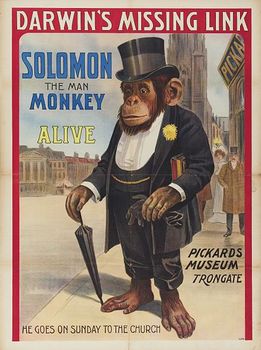Evidence of moral, rational activity in animals
Harvard University Study: Primates expect others to act rationally
When trying to understand someone's intentions, non-human primates expect others to act rationally by performing the most appropriate action allowed by the environment, according to a new study by researchers at Harvard University.[1]
The findings appear in the Sept. 7 issue of the journal of Science. The work was led by Justin Wood, a graduate student in the Department of Psychology in the Faculty of Arts and Sciences at Harvard, with David Glynn, a research assistant, and Marc Hauser, professor of psychology at Harvard, along with Brenda Phillips of Boston University.
“A dominant view has been that non-human primates attend only to what actions 'look like' when trying to understand what others are thinking," says Wood. "In contrast, our research shows that non-human primates infer others' intentions in a much more sophisticated way. They expect other individuals to perform the most rational action that they can, given the environmental obstacles that they face."
The scientists studied the behavioral response of over 120 primates, including cotton-top tamarins, rhesus macaques and chimpanzees. These species represent each of the three major groups of primates: New World monkeys, Old World monkeys and apes. All three species were tested in the same way, and the results showed the same responses among the different types.
In the first experiment, the primates were presented with two potential food containers, and the experimenter either purposefully grasped one of the containers, or flopped their hand onto one of the containers in an accidental manner. For all three species, the primates sought the food container that was purposefully grasped a greater number of times than the container upon which the hand was flopped. This indicates that the primate inferred goal-oriented action on the part of the experimenter when he grasped the container, and was able to understand the difference between the goal-oriented and accidental behavior.
In the second experiment, the researchers asked if the primates infer others' goals under the expectation that other individuals will perform the most rational action allowed by the environmental obstacles. Again, the primates were presented with two potential food containers. In one scenario, an experimenter touched a container with his elbow when his hands were full, and in another scenario, touched a container with his elbow when his hands were empty. The primates looked for the food in the container indicated with the elbow more often when the experimenter's hands were full. The primates considered, just as a human being would, that if someone's hands are full then it is rational for them to use their elbow to indicate the container with food, whereas if their hands are empty it is not rational for them to use their elbow, because they could have used their unoccupied hand.
Developmental psychologists have long understood that young children are able to engage in this type of rational action perception, but scientists have not understood if this ability is unique to human beings, or shared with other animals. This study suggests that this ability evolved as long as 40 million years ago, with non-human primates.
“This study represents one of the broadest comparative studies of primate cognition, and the significance of the findings is reinforced by the fact that these results were consistent across three different species of primates,” says Wood. “The results have significant implications for understanding the evolution of the processes that allow us to make sense of other people's behavior.”
References
This site costs a lot of money in bandwidth and resources. We are glad to bring it to you free, but would you consider helping support our site by making a donation? Any amount would go a long way towards helping us continue to provide this useful service to the community.
Click on the Paypal button below to donate. Your support is most appreciated! |
|---|



